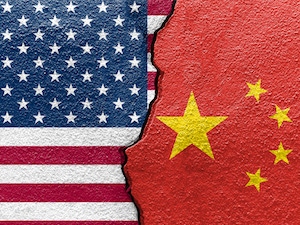U.S. tariffs would hit some medical devices made in China . . . by U.S. companies
“U.S. high-tech companies also do some of their manufacturing in China—it is hard to just pick out Chinese companies,” cautions the president of Chinese medtech company Mindray.
April 4, 2018

 Some medical devices imported from China are among the products that may face a 25% price hike if the Trump administration moves forward with its plan to impose tariffs on a selection of Chinese goods. Medical/surgical equipment is bundled within the optical equipment category in a list of 1,333 tariff items drafted by U.S. Trade Representative Robert Lighthizer. It’s the third largest category on the list, after industrial machinery and electrical machinery. U.S. tariffs, as well as the retaliatory tariffs announced by China yesterday, will not go into effect immediately. Release of the Lighthizer list by the White House leads into a roughly 60-day period when the public can provide feedback and the government holds hearings, according to Bloomberg, and implementation of China’s tariffs will depend on the outcome of negotiations. But that hasn’t calmed nerves on Wall Street, which has been on a roller coaster ride, or anyone with a 401(k).
Some medical devices imported from China are among the products that may face a 25% price hike if the Trump administration moves forward with its plan to impose tariffs on a selection of Chinese goods. Medical/surgical equipment is bundled within the optical equipment category in a list of 1,333 tariff items drafted by U.S. Trade Representative Robert Lighthizer. It’s the third largest category on the list, after industrial machinery and electrical machinery. U.S. tariffs, as well as the retaliatory tariffs announced by China yesterday, will not go into effect immediately. Release of the Lighthizer list by the White House leads into a roughly 60-day period when the public can provide feedback and the government holds hearings, according to Bloomberg, and implementation of China’s tariffs will depend on the outcome of negotiations. But that hasn’t calmed nerves on Wall Street, which has been on a roller coaster ride, or anyone with a 401(k).
If the tit-for-tat tariffs go forward, Chinese companies with U.S. joint-venture partners risk being squeezed on both sides, according to Alexious Lee, the head of China industrials research at CLSA, speaking with the Financial Times. A fair number of medical device OEMs and their supply chains fit that profile. “There will probably be less U.S. investment in China,” added Lee.
Taking that analysis a step further, medical technology company Mindray told the FT that the tariffs would hurt U.S. companies. Headquartered in Shenzhen, China, Mindray has carved out a space in the global medical technology business over the years. Back when I was covering medtech manufacturing, I watched the participation of Chinese companies explode during the late 1990s into the 2000s at Medica, the world’s largest medical device trade show held annually in Düsseldorf, Germany. Early on, Mindray emerged as the leader of the pack. The proposed tariffs would affect Mindray’s patient monitoring devices and chemical reagents used by hospitals to test for conditions such as diabetes, writes the FT. “U.S. high-tech companies also do some of their manufacturing in China—it is hard to just pick out Chinese companies,” said Mindray President Cheng Minghe.
At PlasticsToday, we have been very critical of Chinese trade practices over the years, especially when it comes to intellectual property protection, which is virtually non-existent. If the proposed tariffs lead to negotiations and ultimately a win in the IP column, great. But if they are the opening salvo in a trade war, find a bunker.
Commenting on China’s response to the proposed U.S. tariffs, Commerce Secretary Wilbur Ross told CNBC today that China’s reaction shouldn’t surprise anyone because it is proportionate to the U.S. action. He went on to say that the United States is not entering World War III and that the door is open for a negotiated solution. “Even shooting wars end with negotiations,” he said.
Why do I not find that reassuring?
About the Author(s)
You May Also Like




